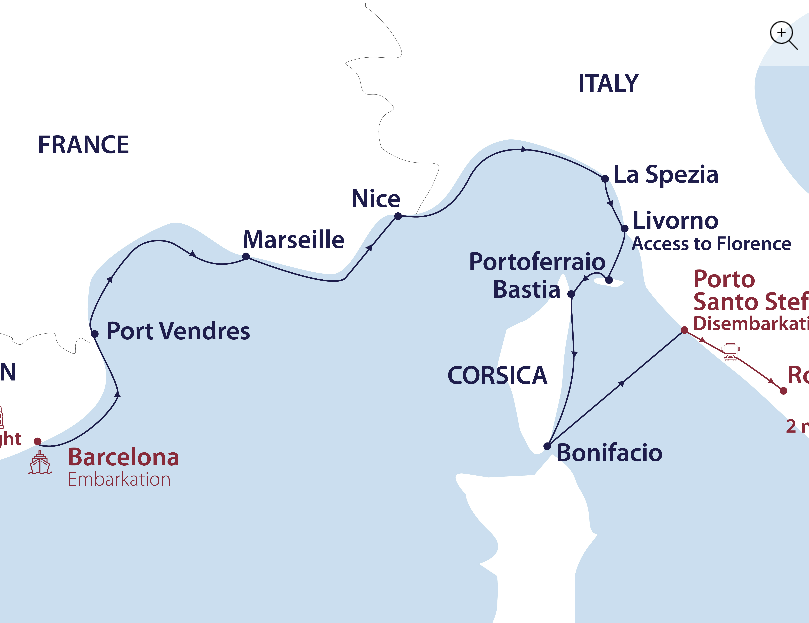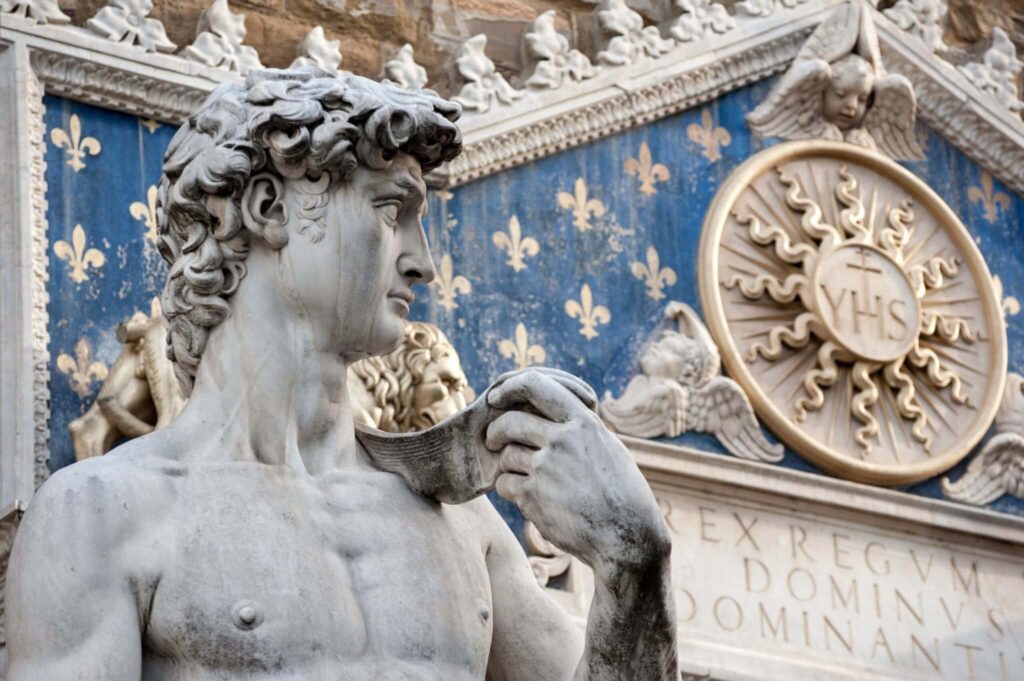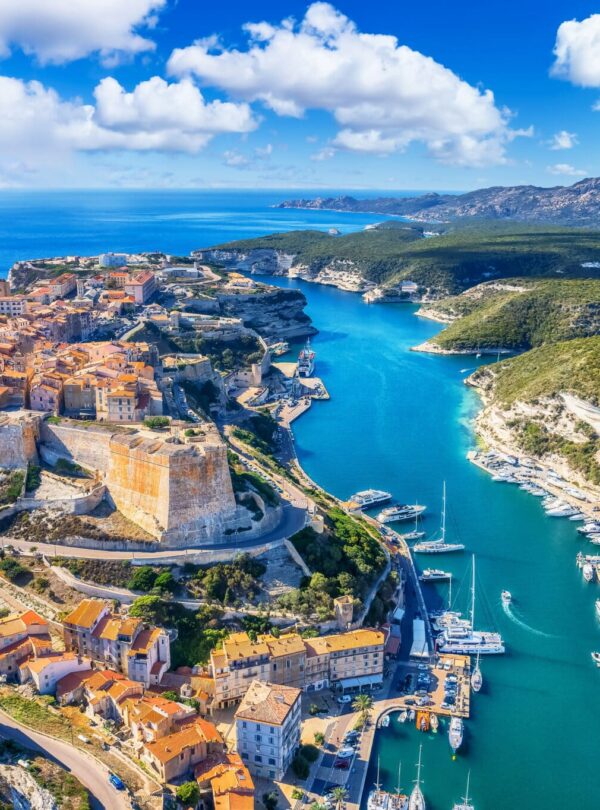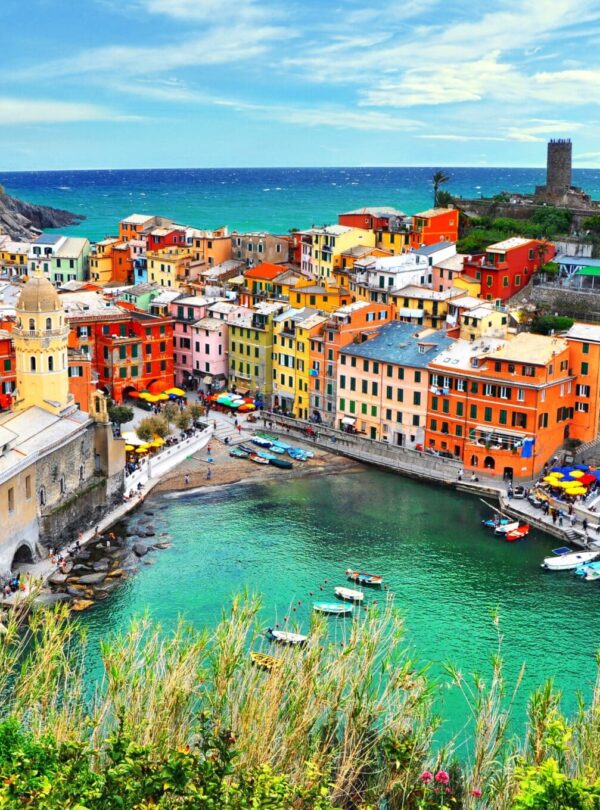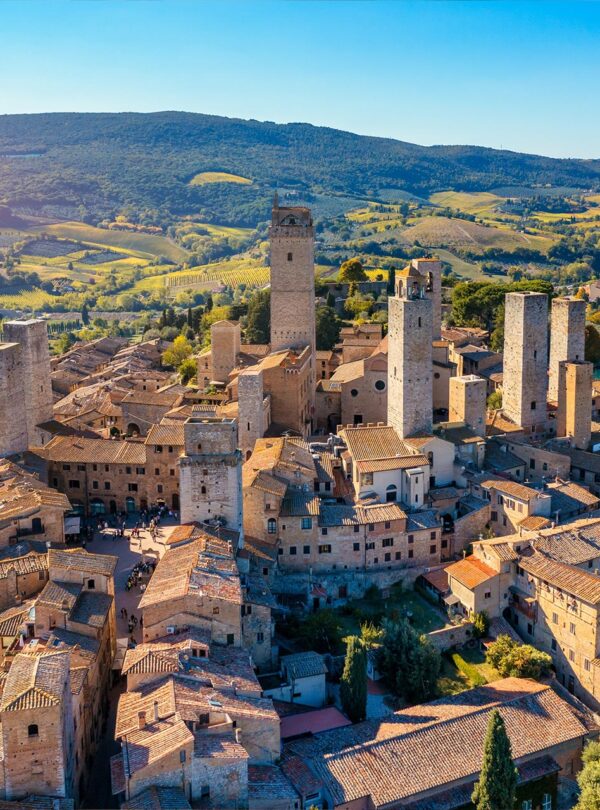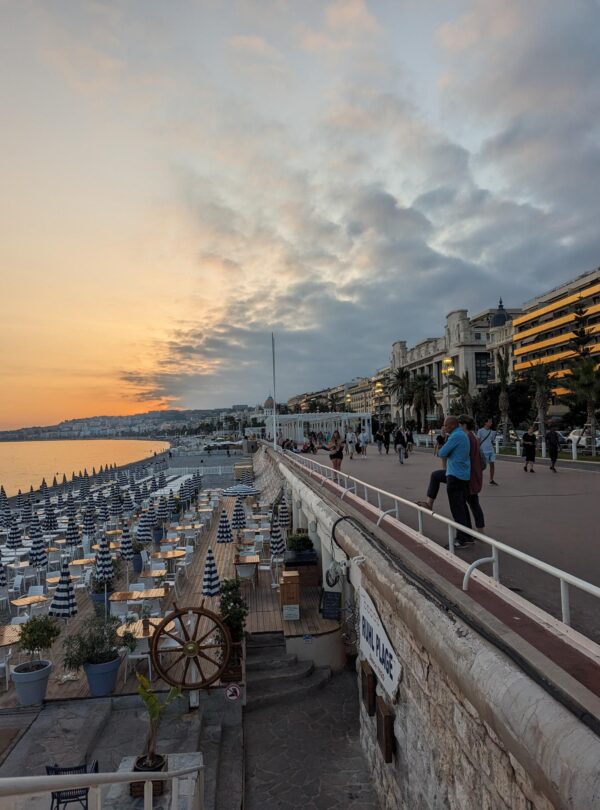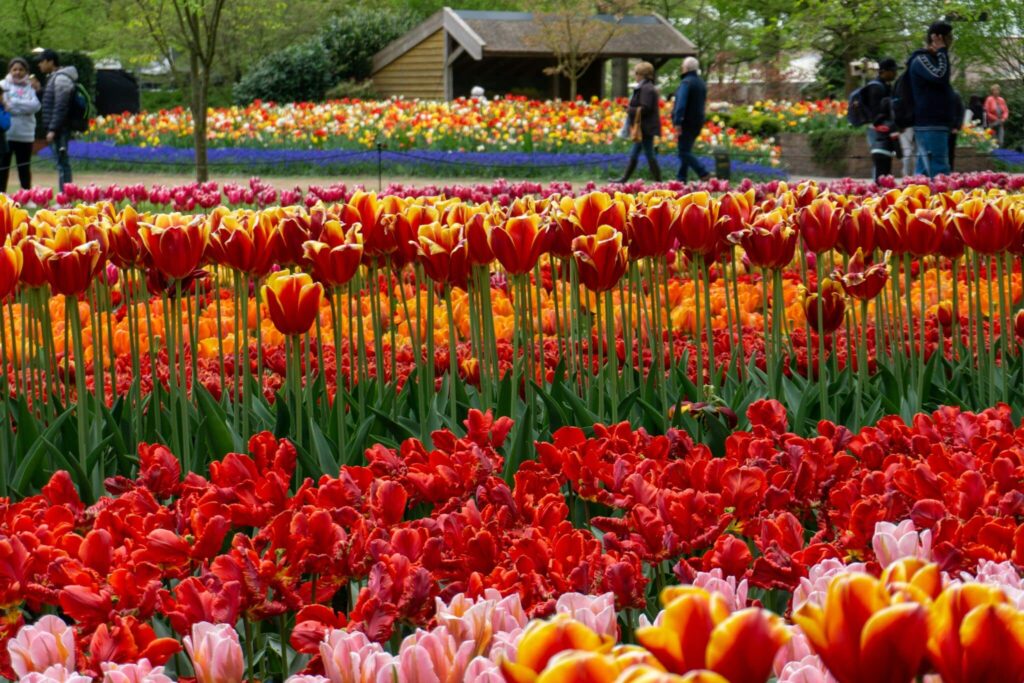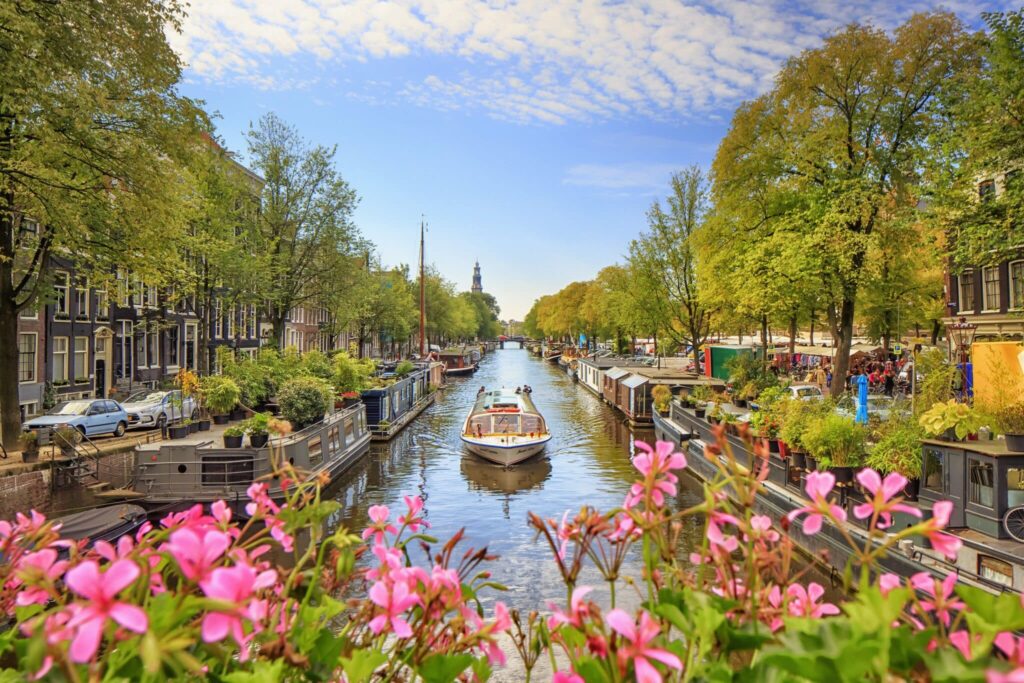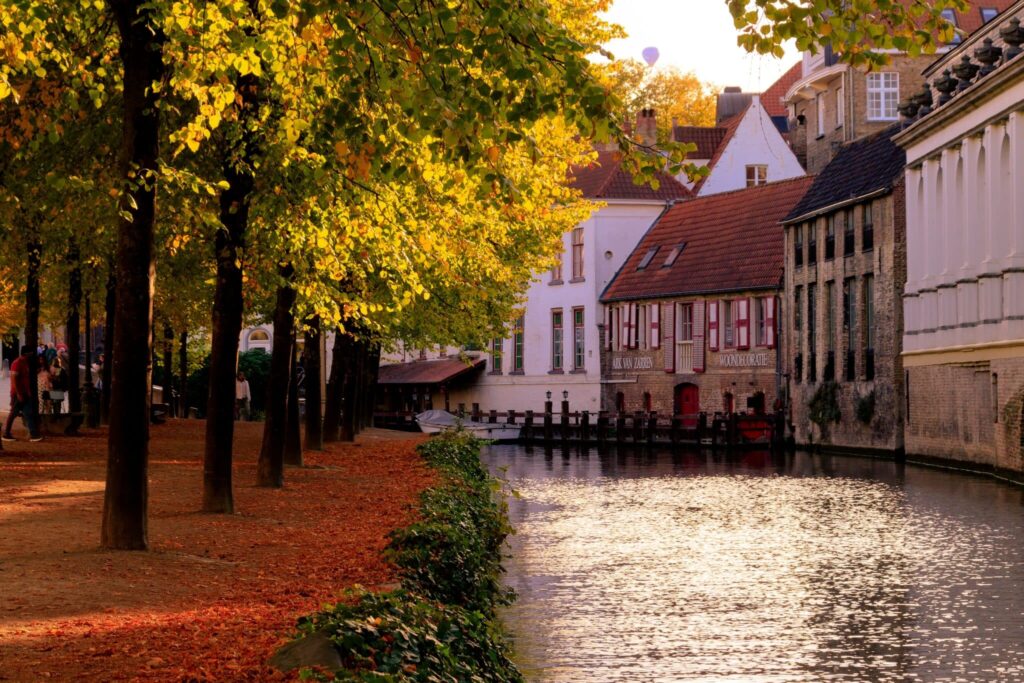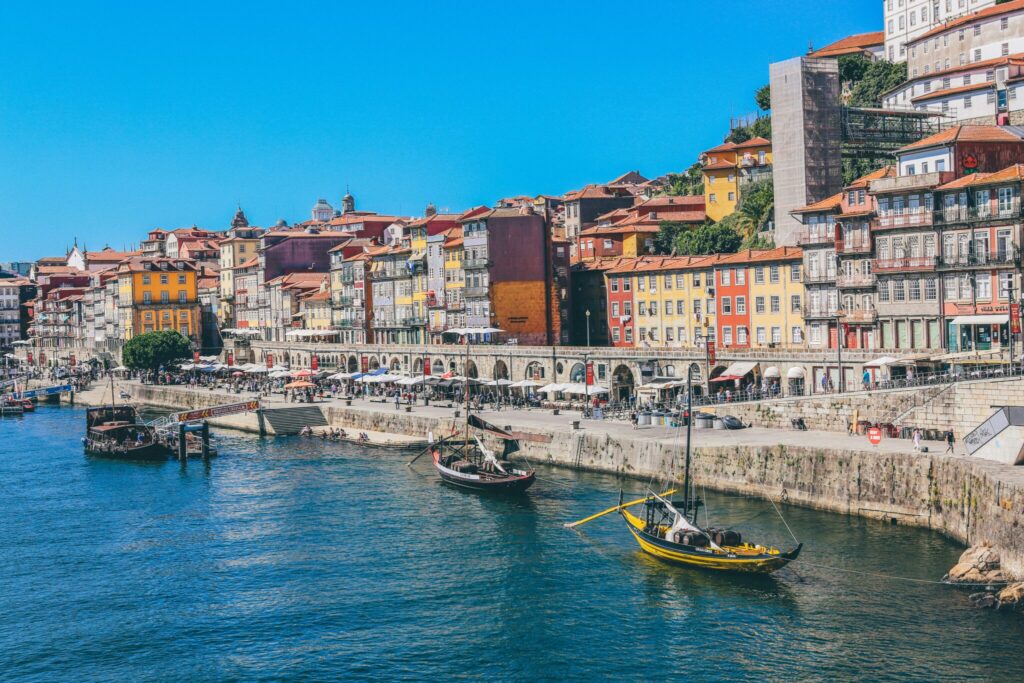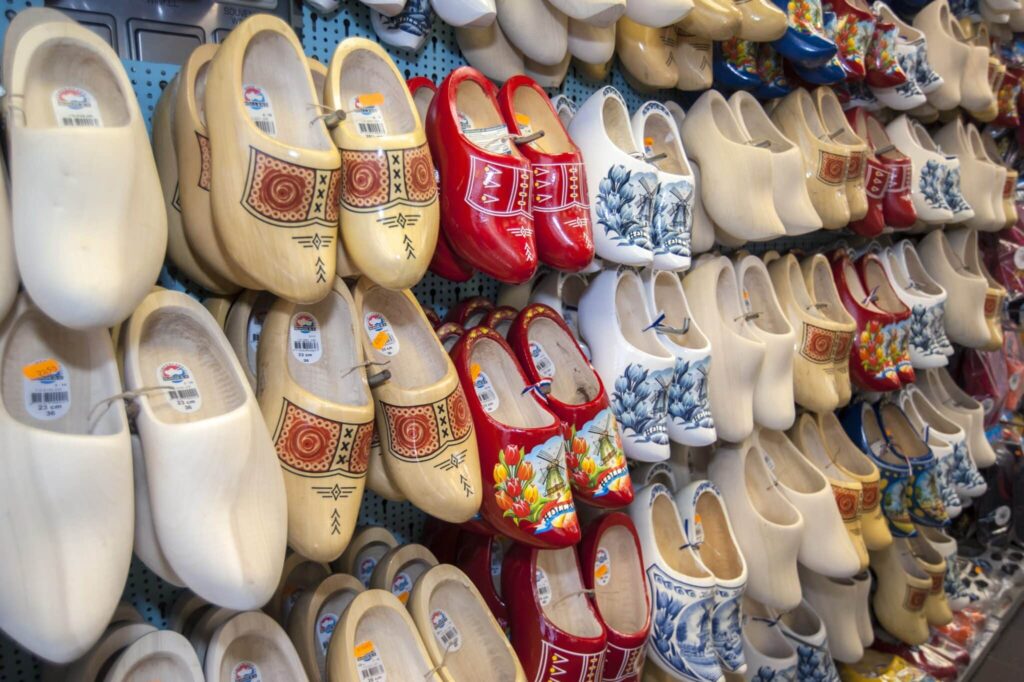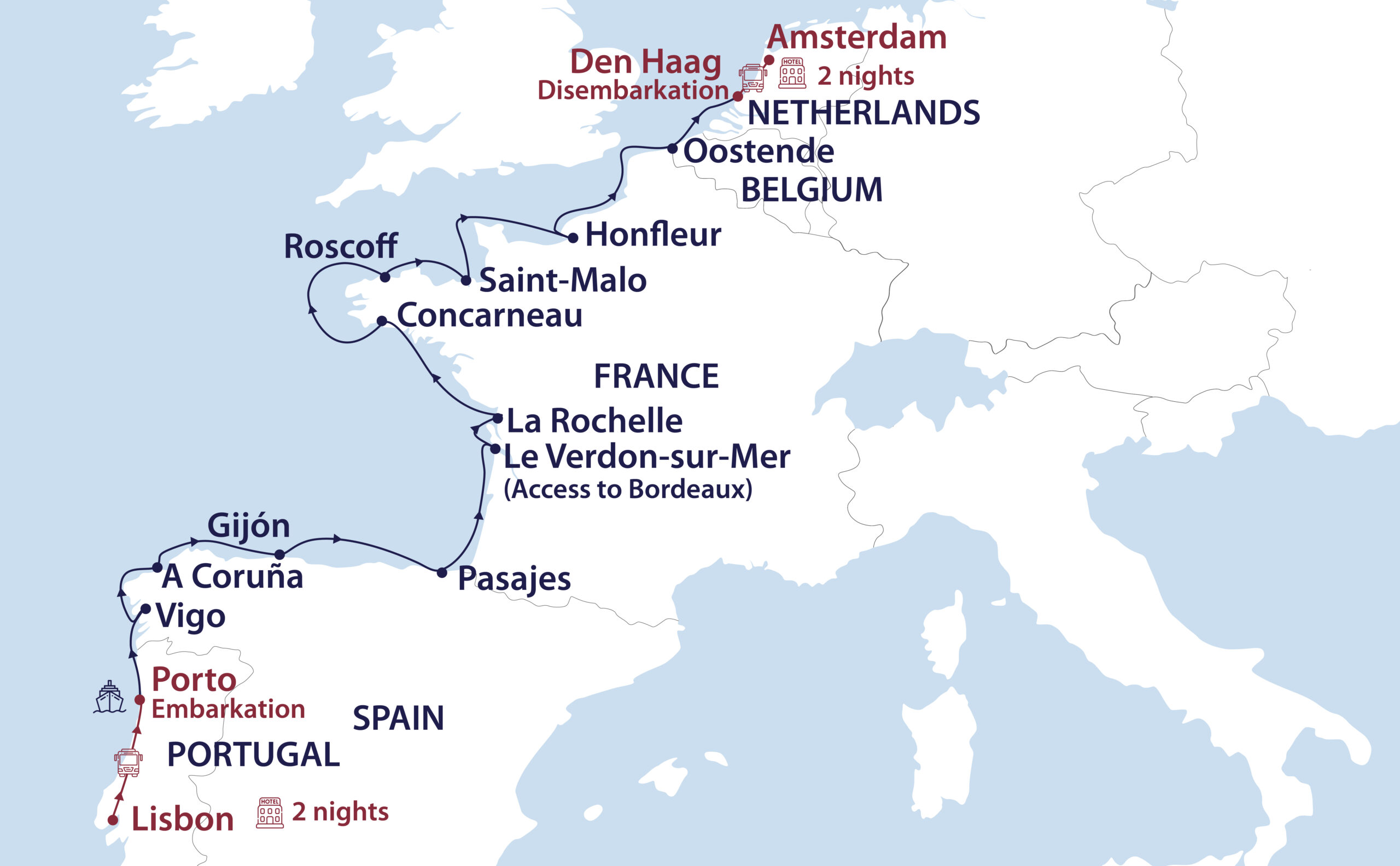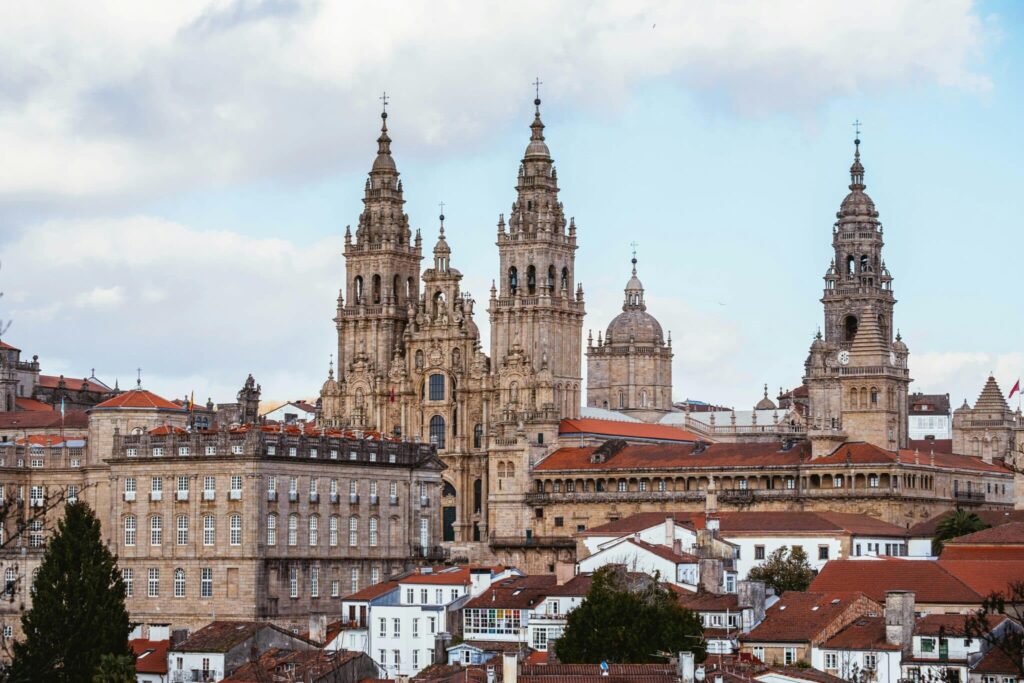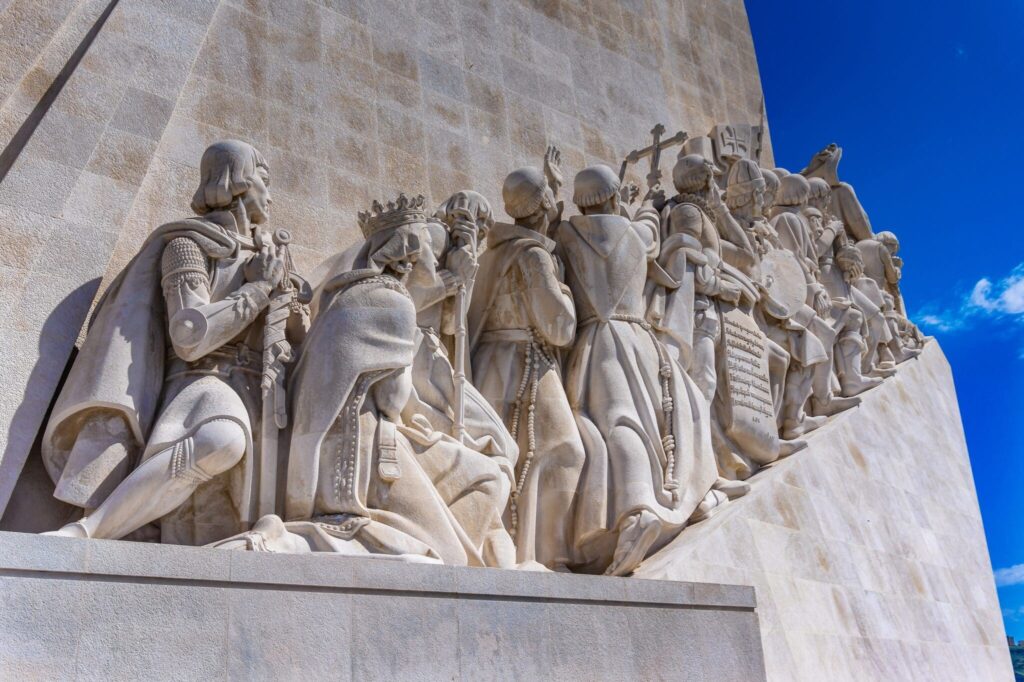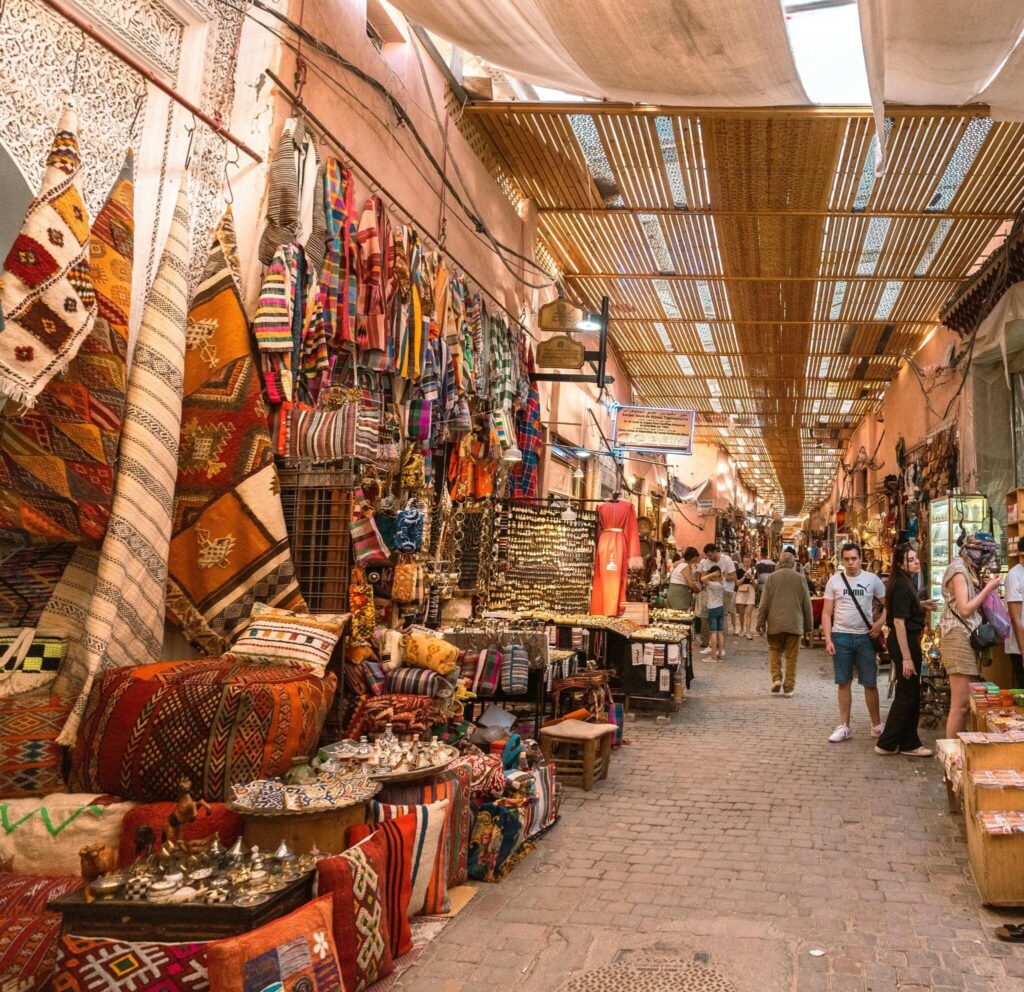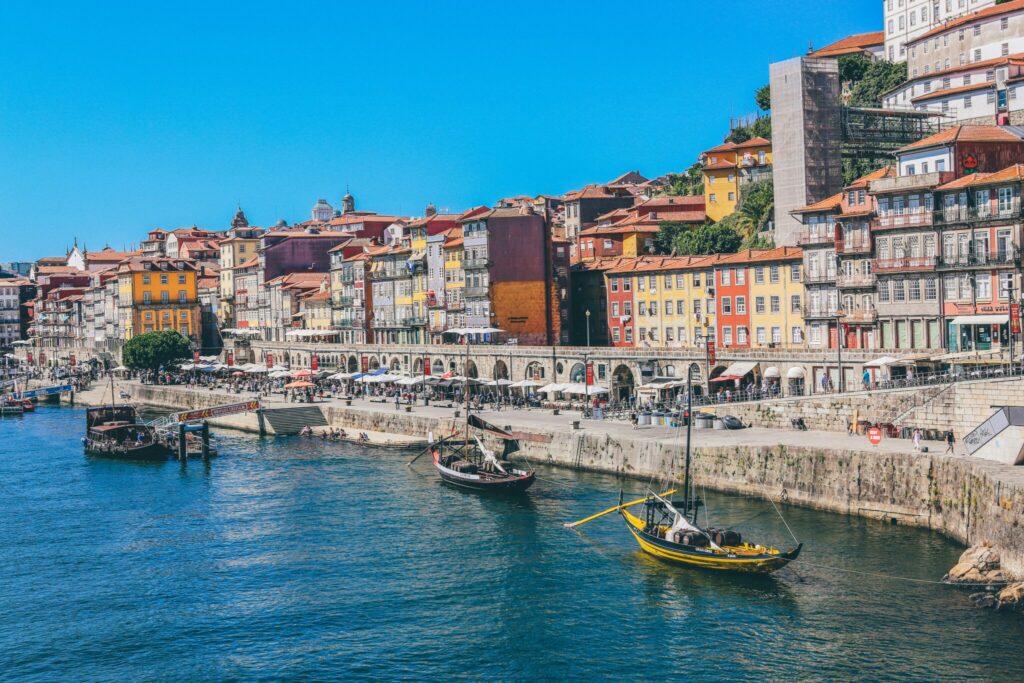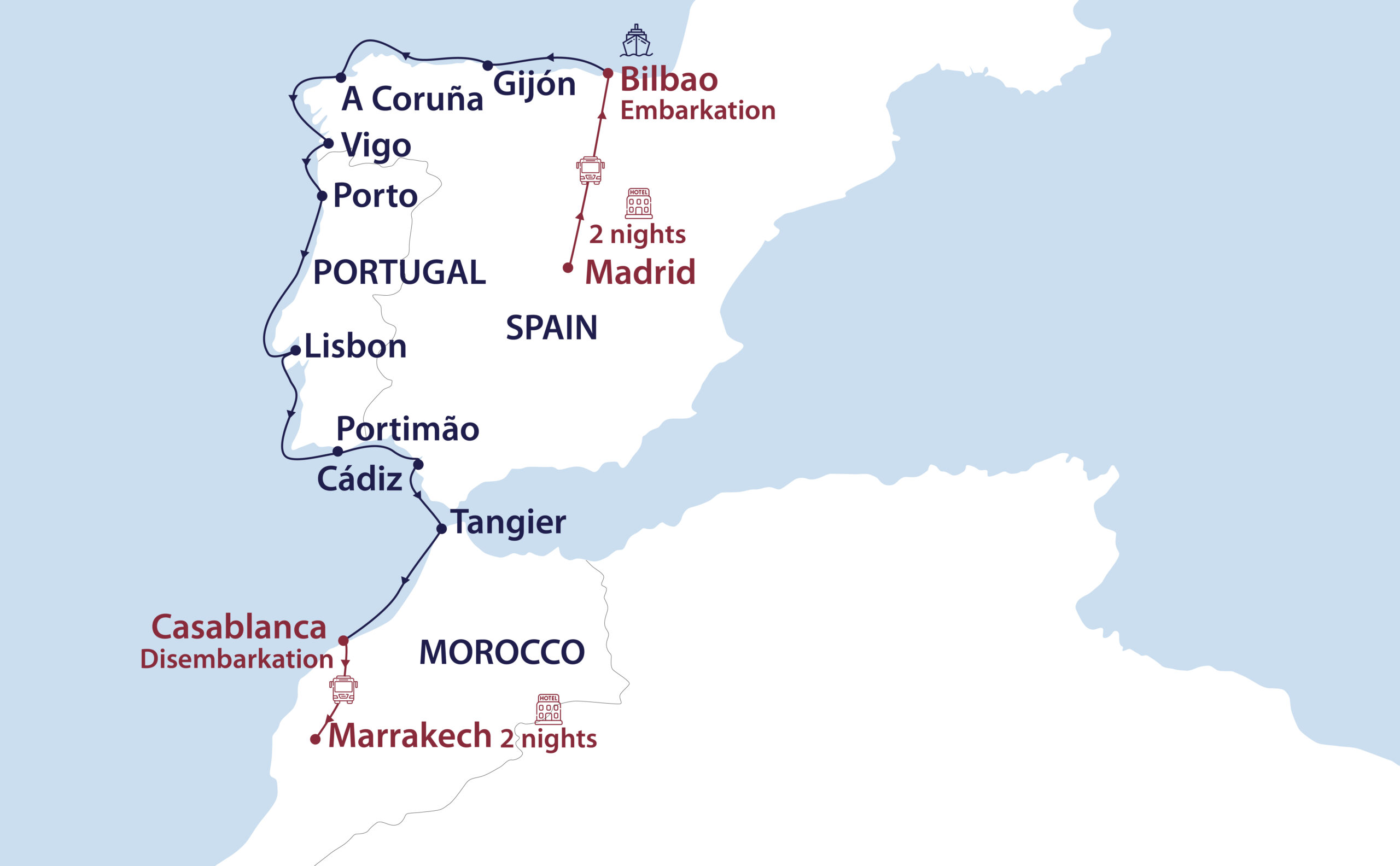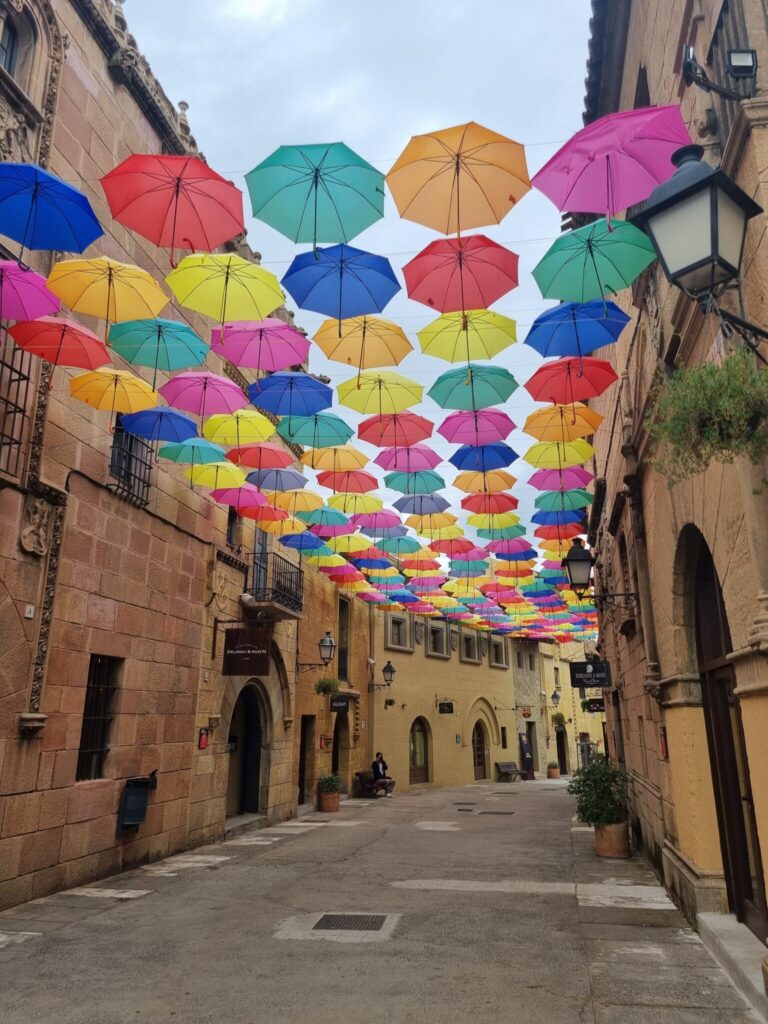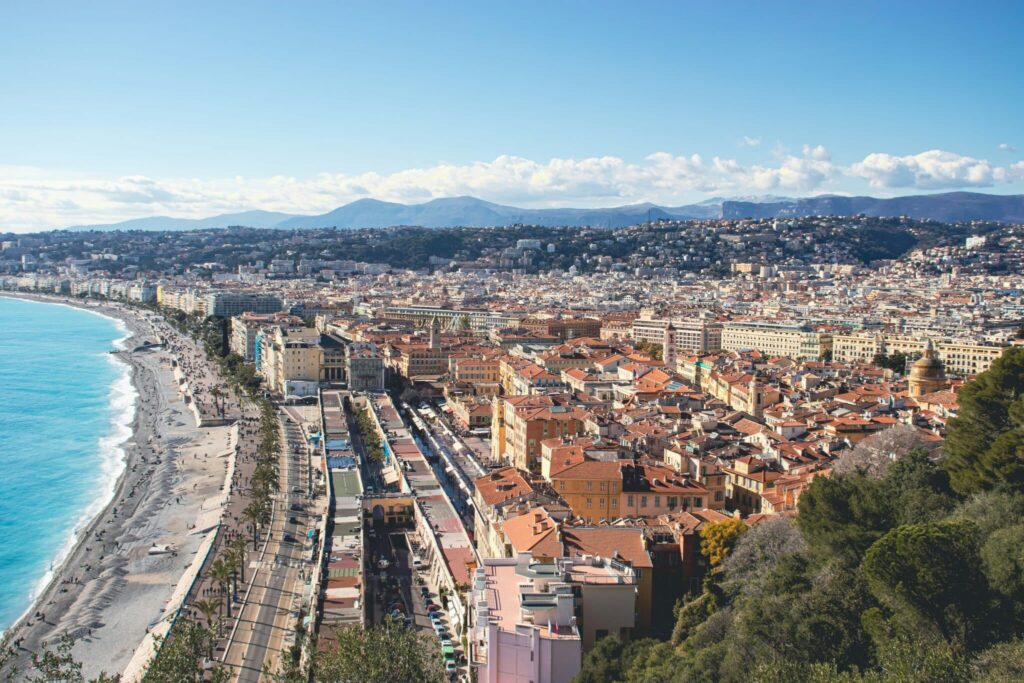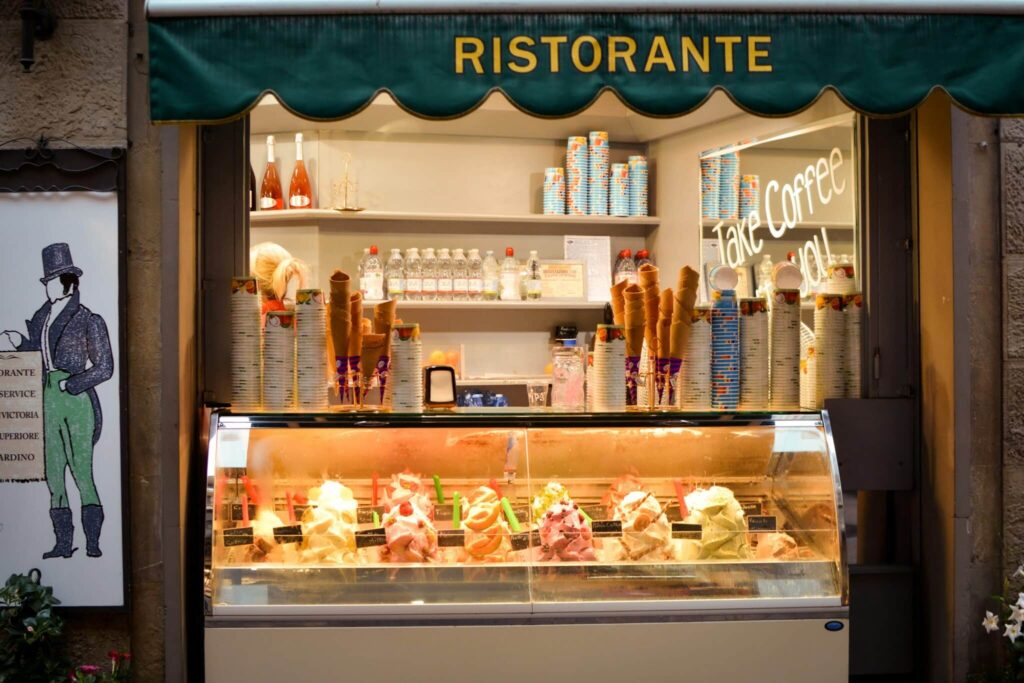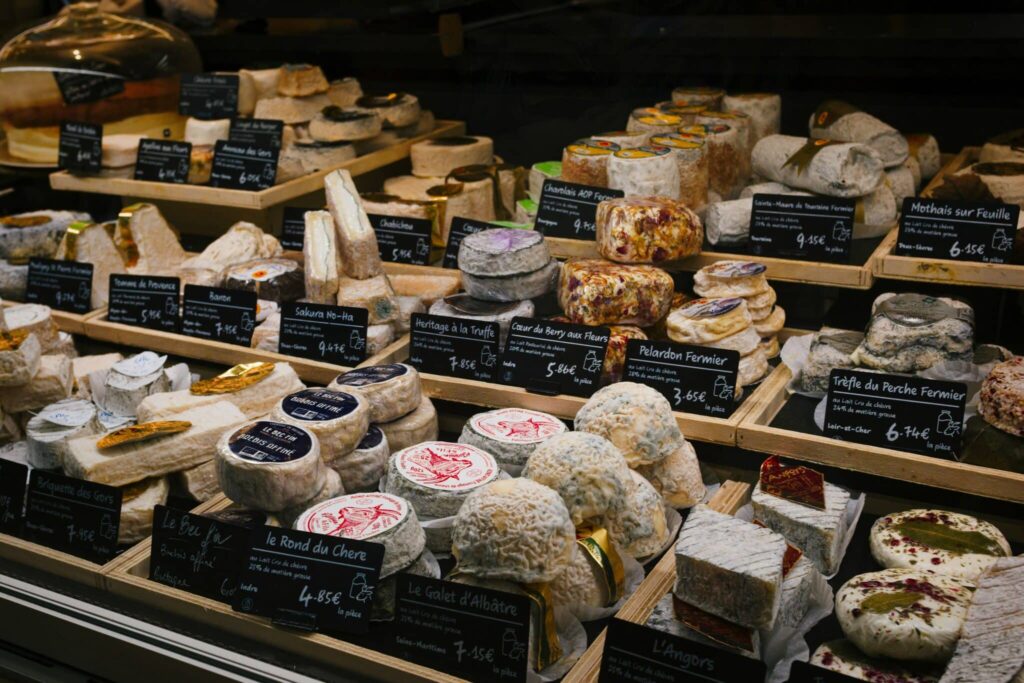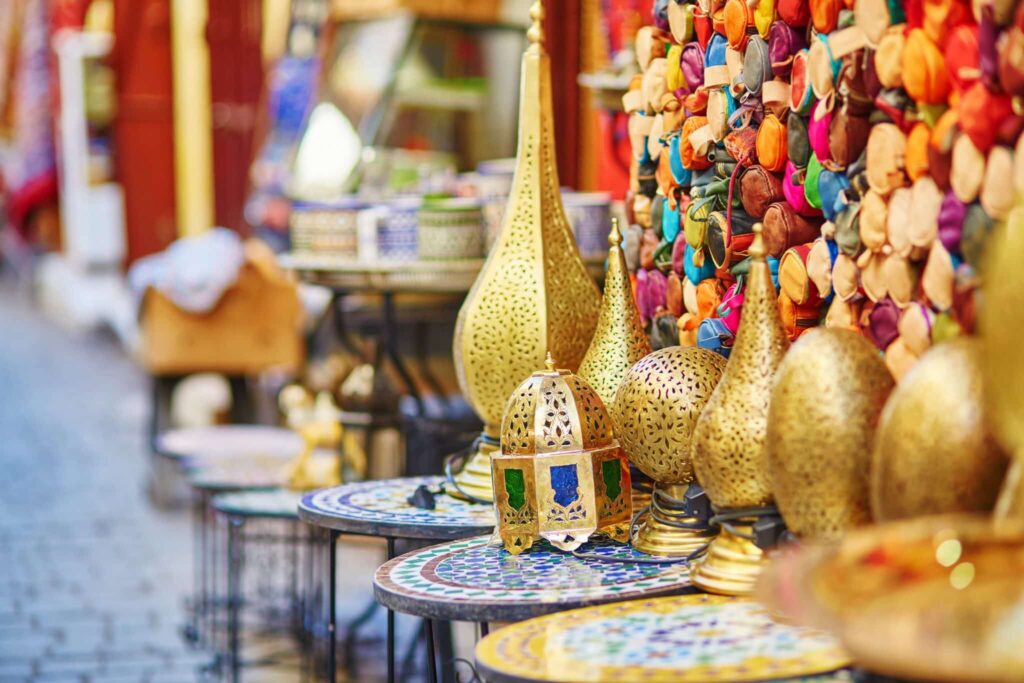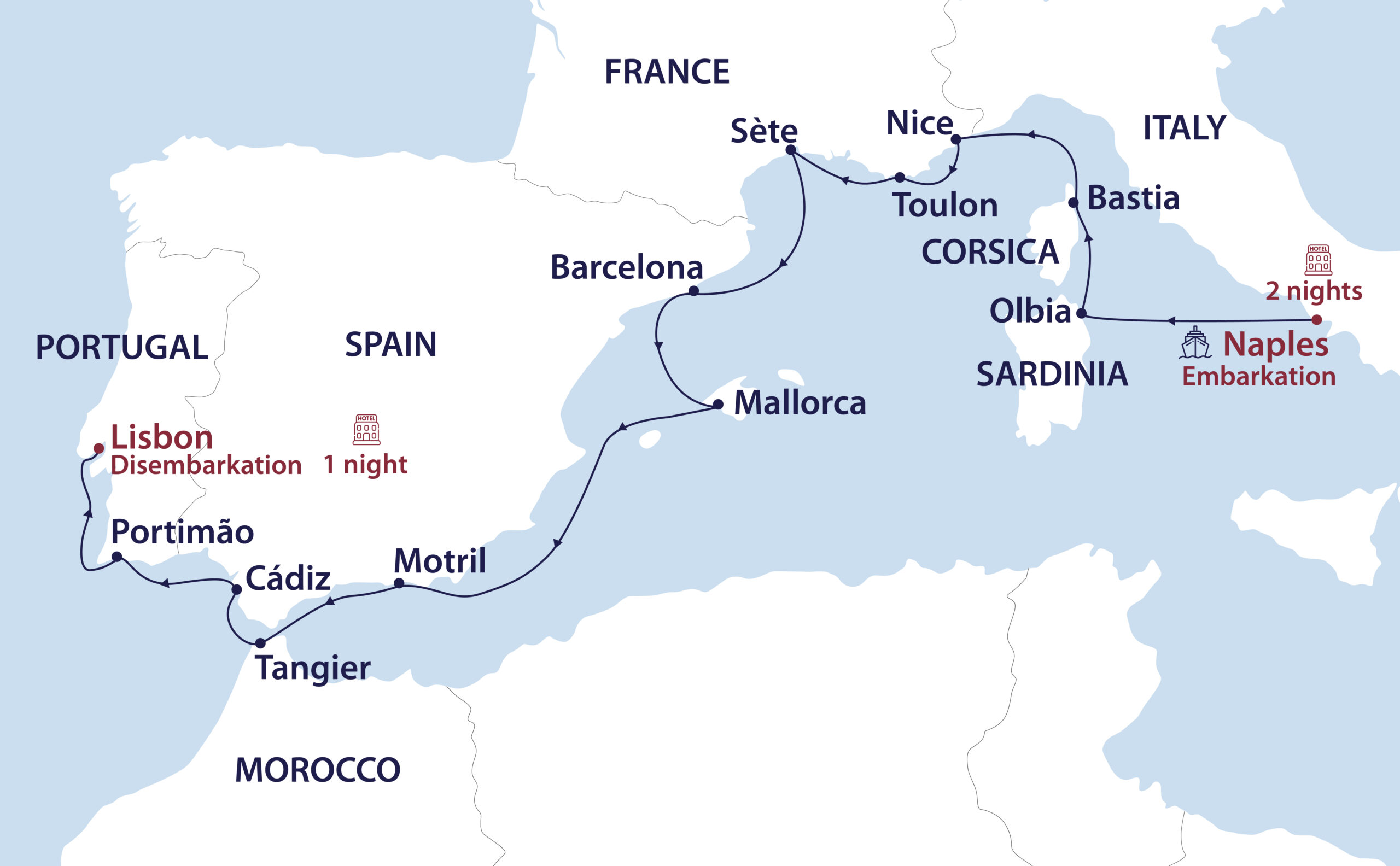Overview
The exclusive ‘Rivieras’ have for centuries inspired artists, architects, authors and actors. This voyage entertains us with tales of the famous faces who sculpted anonymous seaside villages and medieval towns into today’s vibrant slice of European glamour. We’ll follow their vision through the eclectic eras of the renaissance, the grand tour, la belle epoque, the Bon Vivants, the swinging sixties and more, as we explore the Mediterranean’s most sought-after stretch of coast.
Trip Highlights
- Visit museums, studios and mausoleums dedicated to the great impressionists, fauvists, surrealists, modernists and Renaissance artists
- Explore streets and galleries laden with works of art in Barcelona, Genoa, Florence, Monaco and Rome
- Wander the eclectic lanes and alleys of Provencal villages, the Cinque Terre, Portofino and Tuscany’s San Gimignano
- Discover towns, villages and sites that inspired the world’s favourite poets, authors and directors
Itinerary
Bienvenido a España. On arrival at Barcelona Airport make your way to the Arrivals Hall to meet our representative, followed by a transfer to our group hotel. At the hotel, visit our hospitality desk in the lobby to meet our team who will provide you with useful information regarding pre-embarkation procedures and about your time in Barcelona. You will also receive cabin tags for your luggage. Please clearly label the tags with your name and your cabin number on the ship.
This evening, we celebrate our journey together at a Welcome Event in true Spanish style. The artform of flamenco combines song, guitar and dance as it weaves its story, rousing an emotional reaction from its audience. Originally performed by the Roma peoples of Andalusia, flamenco creates a state of mind that is difficult to ignore. Its musical style, where the lyrics often express loneliness and heartbreak, can be compared to the US blues scene with the intensity of the performance stirring deep sentiment. Tonight, we immerse ourselves in tales of the past, told by Barcelona’s master storytellers in the form of music and dance as we embrace the fervour of flamenco.
Accommodation: Barcelona Hotel
Meals: Flamenco Welcome Event
Socially, culturally and industrially, Barcelona shines as a beacon of difference in Spain. Proudly Catalonian first and Spanish second, its people are free-spirited, liberal thinkers with a passion for their freedom. In the last 30 years, Barcelonans have sculpted their city into one of Europe’s most venerated travel destinations. Its boulevard-style main street, Las Ramblas, is the name on every traveller’s lips, and Barcelona’s vibrant is as sought after as it was during the Spanish Empire’s monarchal peak. A palatial stronghold of the 15th century power couple, Queen Isabella and King Ferdinand, Barcelona greeted a jubilant Christopher Columbus upon his return to Spain and the rest as they say, is history. The city has never looked back.
Our locally guided tour this morning celebrates the artists and authors who have long revered Barcelona as a masterpiece for centuries. Famed for its vibrant arts scene, Barcelona shows off its style with works scattered along its plazas and throughout its parks. Miró, Picasso, Vidal, and Montaner all called Barcelona home. But it is the name Antoni Gaudi, which attracts 21st century art aficionados worldwide. We start our day in Barcelona at his masterpiece of modernist architecture – La Sagrada Familia. We explore its intricate interior and exterior with our specialist guide and learn about the history and symbolism of this ongoing construction project, before descending to Plaza de España, Gran Via and the surrounding streets. Next is the elegant avenue of Paseo de Gracia, home to Barcelona’s most inspired modernist architecture.
Having familiarised yourself with the city, your afternoon is free to explore Barcelona’s many attractions. Enjoy a leisurely lunch, stroll along Las Ramblas, visit one of the city’s renowned galleries, or shop to your heart’s content. Late afternoon, we transfer to the Douglas Mawson. This evening, we enjoy a Welcome Dinner onboard where we meet our Aurora Expeditions Team and crew.
The intimate village of Port-Vendres provides access to inland treasures, giving us the opportunity to walk the streets of surrealist-style Figueres, wander the lanes of Collioure, or scale the walls, in true Robin Hood style, of Hollywood’s favourite movie set, the fortified town of Carcassonne. Well, perhaps stand in the shade of its turrets.
Personalise your exploration with our included ‘Your Choice’ experiences.
Option 1 – Morning experience: The Curious Case of Salvador Dali
Our day starts with a drive to Spain, where we visit the home of one of the world’s great surrealist artists, Salvador Dali. Few artists struck an exotic pose as well as Salvador Domingo Felipe Jacinto Dalí i Domènech. Famed for his dripping clocks, dream-induced flying tigers, and emotive spherical portraits, Dali flaunted the art world’s most artistic moustache, a persistently surprised expression and the mind of a genius. True to his unique style, Dali roamed his hometown of Figueres, wearing a bread hat, leopard prints and stripey suits. It is no wonder that the museum dedicated to him is topped by a series of sculpted boiled eggs! This theatre-like gallery is a ‘stand and wonder’, raise one eyebrow, laugh out loud style of museum. We leave with more questions than answers, but we also leave wanting to go back.
Option 2 – Morning experience: Collioure, Perpignan and the Rigaud Art Museum
Our morning is filled with art as we visit Perpignan and the Fauvist haven of Collioure. Perpignan, with its Mediterranean climate and year-round sunshine, is the vibrant capital of the region, known as ‘La Catalane’ for its blend of French and Spanish cultures. In 1963, Salvador Dali famously declared Perpignan station the “centre of the world” upon his arrival. Today, we visit the recently renovated Rigaud Museum, named after the Catalan artist who painted at the court of King Louis XIV. Housed in the combined Hôtel de Mailly and Hôtel de Lazerme, the museum boasts 4,300 square metres of exhibition space showcasing a diverse collection of Gothic, baroque, and 20th-century art. Enjoy these masterpieces in a serene setting, free from the crowds that often flock to the galleries in larger cities.
A half-hour drive from Perpignan brings you to Collioure, a former pirate town and a treasure trove of maritime and medieval wealth. This Catalonian port, with its clear blue sky, colourful buildings, historic heritage and picturesque markets, has long attracted great artists like Matisse, Signac, Derain, and Picasso. The Musée d’Art Moderne preserves the town’s rich artistic history, highlighting the Fauvism movement that began here in the 20th century. Wander the Fauvism trail through cobblestoned alleys to see 20 reproductions of works by Matisse and Derain. For contemporary art enthusiasts, the Maison du Fauvisme offers a closer look at stunning pieces. Collioure is a must for art lovers and history buffs alike. For those wishing to linger longer, a popular coastal walk connects Collioure and Port-Vendres, offering a scenic three-kilometre walk, leading you back to where your ship awaits.
Option 3 – Full-day experience: The Prince of Walled Cities – Carcassonne
Surrounded by turreted walls and a deep moat, Carcassonne has attracted moviemakers since 1908, after French inventors the Lumiere brothers first produced short films using their newly developed motion-picture camera and projector, between 1895 and 1905. The setting for Charles Perrault’s classic tale of Puss in Boots, Carcassonne’s fortified walls offered a fairy tale ambience. Of course, life here was nothing like the ‘men in tights’ Robin Hood movie. The reality of flaming arrows, grapnels, catapulted stones and towers full of French soldiers shattering the peace as the town braced itself for invasion, provides modern-day visitors with a truer tale of life in the Middle Ages. Carcassonne is also a port on one of the world’s most successful engineering endeavours, the Canal du Midi. Running 240 kilometres from Toulouse to the coast, the canal opened the Mediterranean to barge traffic from the Atlantic, an important economic miracle at the time.
The old port of Marseille grants us access to the inspirational fields, streetside cafes and hilltop villages of Provence. The boots of Roman engineers, and the shoes of many an artist, have trodden its soils, but none as famous as the clogs of van Gogh and the slip-ons of Picasso. We spend a day in their shoes with a palette of experiences to choose from.
Personalise your exploration with our included ‘Your Choice’ experiences.
Option 1 – Morning experience: An Artistes Impression of Aix-en-Provence
‘Aix’, as it is simply known to its inhabitants, abounds with leafy boulevards, publics squares and grand avenues – a sign of its wealth and status. Paul Cézanne, who died in 1906, is considered to be one of the most influential artists of the 19th century and remains the favourite son of Aix. This morning, we are introduced to the private world of the artist, when we visit Cézanne’s studio and private residence, before moving on to the Terrain des Peintres. Cézanne often painted here in the later part of his life. As a centennial celebration of his work, these terraced gardens were converted into an open-air museum featuring reproductions of the artwork painted by the man himself at this very spot. Returning to the centre of Aix, we walk the popular pedestrian-only avenue of Cours Mirabeau. A verdant tunnel of foliage, this classic boulevard showcases the aristocratic facades of the city’s opulent hotels and Belle Époque villas with their wrought iron balconies and intricately carved doorways inviting visitors to stop and admire. There’s time to explore Aix further before we return to Marseille and reboard for lunch.
Option 2 – Morning experience: Masterpieces of Marseille
Embark on a captivating journey through Marseille, culminating in a visit to the magnificent Palais Longchamp, a local landmark that blends history, art and architecture in a much-colonnaded splendour. The Palais Longchamp was originally constructed to address a severe water shortage caused by a cholera epidemic in the 19th century, symbolising the city’s resilience and innovation. At the heart of the Palais stands the grand central fountain by sculptor Pierre-Jules Cavelier, celebrating the arrival of water from the Durance River. This dramatic centerpiece is framed by elegant colonnades and adorned with intricate sculptures by Antoine-Louis Bayre.
Within the Palais, the Museum of Fine Arts showcases an impressive collection of 17th- and 18th-century paintings, drawings and sculptures, reflecting Marseille’s rich artistic heritage. Set amid a beautifully landscaped park, the Palais Longchamp remains one of Marseille’s most cherished and must-see attractions.
Option 3 – Full-day experience: Van Gogh’s Arles and Carrières de Lumières
The most prolific ancient Roman architecture of Provence can be found in Arles. We explore its Roman amphitheatre, the forum square and Roman circus, before leaping forward a few centuries to meet the town’s most tortured soul. Treading the quaint cobbled streets of Arles, one can only wonder what made Vincent van Gogh so miserable. Inspired by the Provençal light, van Gogh produced over 300 paintings during his 15 months here. Many of his paintings depict classic sights dotted around town, which we recognise as we follow in his footsteps while the city bares its soul through his paintings. Lunch is enjoyed at a typical Provençal bistro en route to the spectacle that is Carrières de Lumières. Literally translated as the Quarry of Light, this abandoned quarry hosts a tribute to the numerous artists who once called this region home. A visual display of world-famous paintings envelops us in the world of art, accompanied by musical overtures which match the era.
The yacht-filled harbour of Nice plays host to the Douglas Mawson today, granting us a millionaire's access to the French Riviera. To most travellers this name depicts the shoreline connecting Antibes to Nice. Its wide Promenade des Anglais, named after the English upper class who placed Nice at the top of their Grand Tour bucket list, follows the Mediterranean coast past an array of Belle Epoque hotels, Art Deco apartments and sun umbrellaed beaches. At the limit of the ruling House of Savoy both physically and politically, the people of the riviera voted to join France in the 1860s rather than the new Kingdom of Italy, making this region a unique blend of both cultures. The angle of light, relaxed lifestyle and extravagant parties attracted as many artists and members of the literary alumni in the 20th century as it had aristocrats the century before. From Monet, Chaplin and Valentino in Antibes to Bonnard at Le Cannet, and Picasso – well just about everywhere – it became the place to be seen for the avant-garde. This pocket of sunshine and decadence still attracts artists, authors and actors, who paint its vistas, write its stories and come to Cannes to be adored.
Personalise your exploration with our included ‘Your Choice’ experiences.
Option 1 – Morning experience: A Nice Place to Paint
The Grande Dame of the French Riviera hosts our locally guided walking tour this morning. Throughout Nice’s history, A-listers have flocked to it in abundance – Queen Victoria, the Russian Tsarinas, old money, new money, and entire Hollywood studios. Waiting in the wings to paint them, write about them, design their clothes, swimwear and perfumes, were Europe’s artists, authors and designers. We search for Queen Victoria’s favourite chocolate shop, stroll the streets of Nice’s old town, and soak up the ambience that is the Riviera’s favourite city. Our visit includes one of Nice’s top galleries. Considered one of Judaism’s greatest artists, Marc Chagall escaped Vichy France thanks to a US journalist, Varian Fry, and the organisation that would become the International Rescue Committee. After the war he returned with his artwork, some of which is displayed in his museum in Nice.
Option 2 – Morning experience: The Principality of Monaco and Prince Albert’s car collection
From the days of its early Genoese rulers, the ever-expanding Principality of Monaco has been a political curiosity on the map of southern Europe. Ruled as a business rather than a country by the Grimaldi family, this exclusive enclave offers an insight into the lives of the ‘filthy rich’. Ferraris replace Fiats, designer dogs are carried in handbags and champagne flows like water, all thanks to an economy, which has earned the respect of, rather than robbed from, the rich. Smaller than New York’s Central Park, Monaco’s 500 acre size, boasts the second highest GDP per capita in the world. Although the 9,500 native Monégasque are banned by law from gambling, it is the nation’s foreign-born citizens with their bulging bank accounts, multi-million euro apartments and high-roller habits who boost the principality’s income, with over 30 per cent of its residents listed as millionaires.
Our guided walking tour introduces us to this unique place, culminating with a visit to Prince Albert’s own car museum. Following in the footsteps of Grace Kelly at the superyacht-filled marina, we recall how she met Prince Rainier during a visit to Monaco suggested by a friend while filming To Catch a Thief. Within a year, they were wed, and Grace Kelly became a princess, with 140 official titles. Her tragic passing left Monaco in mourning, with her face, name and favourite things found throughout the principality, reminding us of her enduring legacy. Our tour includes the palatial precinct known locally as ‘The Rock’, and the Cathedral (also known as Cathedral of Our Lady Immaculate), where Princess Grace and Prince Rainier were married and now rest. Moving to the waterfront, our journey takes a hairpin bend. From a wartime Ford Jeep to Prince Albert’s favourite Bugatti, the Prince’s private collection is packed with rare vehicles, Formula 1 winners and numerous Ferraris, Lamborghinis and the odd Rolls-Royce. Appealing to car aficionados and non-drivers alike, this decadent display is set to impress.
Option 3 – Half day: The Villa Ephrussi de Rothschild
This experience showcases Nice’s decadent past, with a focus on the region’s most exclusive enclave. We follow the Basse Corniche along the coastline to the private knoll of Saint-Jean-Cap-Ferrat, where we tour and enjoy a light lunch at one of the Riviera’s real treats. Synonymous with the word ‘exclusive’, Cap Ferrat is the home to generations of wealth. With a phone book full of famous names, there are a few stand-outs – one being Rothschild. The imitation Renaissance-style palazzo of Villa Ephrussi de Rothschild must be seen to be believed. Surrounded by exotic, Provençal, Japanese and Florentine gardens, it was built in 1905 by Baroness Beatrice Rothschild to showcase her passion for all things art. Without an heir, the Baroness bequeathed the seven hectares of land and some 5,000 works of art to the Academy of Fine Arts, giving ‘commonfolk’ the chance to immerse themselves in her lifestyle, if only for a morning.
Option 4 – Full-day experience: Picasso’s Antibes and Saint-Paul de Vence
Pablo Picasso, as vibrant, colourful and surreal as his works, is one of the most captivating figures in art history. Though Spanish by birth, his heart found a home on the French Riviera and its enchanting hinterland. The two months Picasso spent at Antibes’ Castle Grimaldi marked one of his most prolific periods, where the blend of swimming, painting and socialising became a daily rhythm. Amid the post-war exuberance, Picasso thrived in the Riviera’s lively atmosphere, surrounded by friends, admirers, and a devoted 23-year-old girlfriend, all of whom adored him.
Explore Picasso’s masterpieces at Castle Grimaldi, where his creativity flourished, before heading inland to the medieval village of Saint-Paul de Vence. Here, our local guide will captivate you with tales of the renowned artists who were drawn to this quintessential Provençal village, including Picasso, Modigliani, Dufy, and Matisse. Enjoy a delightful lunch in this hilltop village, where the vibrant colours and artistic heritage are as rich as its history. Marc Chagall, who returned from exile during World War II and lived in the village for 19 years, rests in the local cemetery, adding a final touch to the area’s artistic legacy.
The port of La Spezia is our base today for two of the region’s favourite experiences. One, a series of towns collectively seen as works of art. The other, the source of art’s most cherished material.
Personalise your exploration with our included ‘Your Choice’ experiences.
Option 1 – Full-day experience: The Villages of the Cinque Terre
Literally translated as ‘the five lands’, these villages traverse a series of coastal ravines and rugged ridges along a 14-kilometre stretch of the Ligurian coast. The steep coastal landscape of the Cinque Terre has afforded them an idiosyncratic lifestyle for centuries, as they staved off pirates, fought off floods and resisted invasions. The UNESCO World Heritage Sites of Monterosso al Mare, Vernazza, Corniglia, Manarola and Riomaggiore retain their authentic determination, preserving individual dialects, traditional trades and communal ties. Almost inaccessible until the 1870s, the Cinque Terre represent a microcosm of Italian coastal life. They showcase sun and sea, good food and wine, and a relaxed charm. Guaranteed to make any traveller smile. We board our ferry, which will whisk us away to two or three scenic villages, depending on the weather. Our local guide will share the history of each waterfront hamlet, and we'll have time to explore and enjoy the sights.
Option 2 – Morning experience: Carrara Marble Quarry
It is from these cliff-side quarries that artists gleaned their marble. Formed when limestone is transformed by heat and pressure, Carrara marble is thought to be the finest in the world, with no or few stains, though natural stains can be incorporated into the work itself. Artists, such as Michelangelo, came here to select the marble they would sculpt into masterpieces. Michelangelo being extremely hands-on by nature, spent prolonged periods onsite at the marble quarries in Carrara, where he not only chose marble but gave precise orders regarding the sizes and shapes of the blocks, and even became involved with the building of roads to transport the stone. Our tour takes us to an altitude of 1,000 metres, where we visit the quarrying site while our guide speaks of ancient and modern methods of excavation. This is a working site and we see marble cut from the quarry bench and loaded as marble blocks ready for transportation. We also capture breathtaking views over the Apuan-Versilian coastline, the Cinque Terre villages and the Gulf of La Spezia.
When Italians give birth they use the phrase, dare alla luce, which literally means to ‘give to the light.’ It is no coincidence that the Grand Duchy of Tuscany, widely acknowledged as having dragged Europe from the dark days of the Middle Ages into the light, was synonymous with the Rennaissance or The Rebirth. Rising from the ruins of the Roman Empire, Tuscany flourished into a wealthy trading and banking centre becoming Europe’s first capitalist state. The Duchy’s ruling family, the Medicis, sponsored its artistic scene with fervour. Artists transitioned from tradespeople to celebrities overnight, with da Vinci playing lute at their private parties and Michelangelo befriended by men who would become popes. The ruling classes commissioned works of art such as Donatello’s Penitent Magdalene, Cellini’s Perseus with the Head of Medusa, Botticelli’s Birth of Venus and Raphael’s Madonna del Cardellino. Throughout the Duchy, art was showcased in piazzas, scattered throughout the streets and placed at the townhall steps. A form of propaganda and sign of power for all to see.
Personalise your exploration with our included ‘Your Choice’ experiences.
Option 1 – Full-day experience: The Rebirth of Florence
Accessible to all who visit, Florence’s works of art are scattered throughout its streets as statues, fountains, chapels and bell towers, and all looked down upon by Brunelleschi’s magnificent domed cathedral. Even the gelato is sculpted in Florence!
Carved from a single slab of marble, Michelangelo’s David is the ultimate Renaissance man, commissioned as the centrepiece for the city’s main square. Today it sits in its own gallery, but a replica at its original location tells its story almost as well. Our locally guided tour walks us through a day in the life of Renaissance man as we tread the streets where the early artists plied their trade, sought wealthy patrons and huddled in backstreet studios to learn from the masters.
Option 2 – Full-day experience: San Gimignano
When filmmakers look to Italy for locations, they need look no further than the Tuscan gem of San Gimignano. Tea with Mussolini, A Portrait of a Woman, Gladiator, Life is Beautiful, The English Patient and Under the Tuscan Sun all feature scenes shot here. San Gimignano itself is a work of art. The town’s medieval architecture serves as a backdrop for everything Tuscan, with artisan shopfronts displaying everything that is superb about Italian food, and cafes offering everything that is wonderous about Italian cuisine. Even its streets and cobblestone alleys wind in a way that makes every corner worthy of exploration. And did we mention its towers? It is the town’s 14 remaining medieval towers proudly rising above its skyline, which preserve the town’s feudal appearance and confirm San Gimignano as the superlative of Tuscan towns.
Sailing south we arrive at the island of Elba. Elba’s rich history extends far beyond its famed connection to Napoleon Bonaparte. Portoferraio, the island’s capital, is perched on a dramatic promontory and is one of Elba’s oldest settlements, tracing its roots back to the Ligurians, Etruscans and Greeks. The town’s current form was shaped under the Tuscan Grand Duke, Cosimo I, who renamed it Cosmopoli and fortified it in 1548 to protect against pirate raids. These formidable defences, visible from the sea, successfully repelled the notorious Turkish privateer Dragut. Portoferraio is also celebrated as Napoleon’s residence during his exile from 4 May 1814 to 26 February 1815, adding a significant layer to its historical allure. Follow the footsteps of ‘the little emperor’ or enjoy a swim in ‘the Med’ before returning to the ship for lunch. There’s time this afternoon to explore Portoferraio before we sail to Corsica in the early evening.
Personalise your exploration with our included ‘Your Choice’ experiences.
Option 1 – Morning experience: Elba’s Exiled Emperor
Embark on a captivating half-day tour of Elba Island, starting with a deep dive into Portoferraio’s Napoleonic heritage. Napoleon Bonaparte was exiled to Elba in 1814 following his abdication as Emperor of France, a strategic move by the victorious Prussians and British to contain him. Despite the island’s confinement, Napoleon’s exile was marked by significant activity, including administrative reforms and fortification projects. Explore the Villa dei Mulini, Napoleon’s former winter residence, where you can view artefacts and paintings from his time on Elba. Enjoy the garden, featuring a replica of Canova’s La Galatea and a statue of Minerva, along with panoramic views of the Tuscan coast. Next, visit the historic Forte Stella and Forte Falcone, fortifications Napoleon commissioned to bolster Portoferraio’s defences. However, his exile was short-lived. He escaped in 1815, briefly reclaimed leadership of France, and was soon defeated at Waterloo before being exiled again, this time to the island of Saint Helena.
Option 2 – Morning experience: Capoliveri Village with Beach Escape
Embark on a journey to Capoliveri, a village perched at 413 metres on Elba Island. This picturesque locale blends medieval architecture with rich history. Begin with a guided tour through narrow streets and archways, known as chiassi, before exploring the town at your own pace, browsing boutiques and taking in the atmosphere.
Capoliveri’s coastline features cliffs and serene bays. Take time to visit the beach beneath the town, where there will be time for a swim. An area of the beach offers sun umbrellas and lounge chairs for rent (own expense), providing a comfortable spot to relax. After enjoying your time at the beach, board your coach for a scenic 45-minute drive back to the ship in time for lunch.
Our journey today takes us to a slice of France in the Mediterranean. Though it has been part of France since 1769, Corsica maintains a distinct identity, blending Italian and French influences due to its historical ties with both nations. Known for its rugged landscapes, winding roads and craggy coves, Corsica’s 340,000 inhabitants have a strong sense of regional pride, tested annually by an influx of three million tourists. The island’s status as a territorial collectivity grants it greater autonomy within the French Republic, allowing for the preservation of its Corsican language and customs. This blend of French governance and Corsican heritage creates a rich, multifaceted culture that sets the island apart from mainland France.
Our first port of call sits on the northern tip of this ‘holiday’ island; Bastia. Founded in 1378 by the Genoese, Bastia retains a flamboyant mix of French and Italianate flavours more than much of the island, making it quintessentially Corsican. This Baroque coastal town's historic centre exudes the timeless, salty atmosphere of an ancient Mediterranean port. Its name derives from "bastion” - referring to the Genoese fortress built as a stronghold against rebellious islanders. The Terra Vecchia (Old Town) is best explored on foot where vibrantly coloured houses once served as recognisable markers for sailors upon their return from sea voyages, a tradition still honoured today.
Personalise your exploration with our included ‘Your Choice’ experiences.
Option 1: Morning experience: Cap Corse Peninsula
Embark on a scenic tour of the Cap Corse peninsula, where rugged mountains plunge dramatically into the sea. As you navigate the winding roads, you’ll find views of crystal-clear bays, hillside villages, and Corsica’s wild, unspoiled landscapes. Known as 'the island within the island', Cap Corse remained isolated until the late 19th century, preserving its unique beauty and traditional character.
Local conditions permitting, we visit the picturesque marina of Erbalunga and explore the seaside villages of Sisco, Pietracorbara, and Porticciolo. Ascending the eastern slopes into the mountains we continue to the western coast at Pino for panoramic views of lush hills and the azure sea. Finally, discover Nonza, perched on a dramatic black rocky promontory with sweeping vistas of the Mediterranean and its famous black sand beach. This tour promises a unique experience of Cap Corse’s rugged allure and cultural depth. (Note: This excursion involves many winding roads, which may not be suitable for those prone to car sickness or vertigo.)
Option 2: Morning experience: Wine Tasting in the Patrimonio
Experience the charm of Corsica’s Patrimonio wine region, renowned for its unique terroir. Located in the northwest corner of the island, Patrimonio’s rugged, scrub-covered landscape features soils distinct from the rest of Corsica, enriched by chalky clay and limestone. The region benefits from a wide temperature range between day and night and is influenced by the cooling sea winds from the Ligurian Sea. Patrimonio, one of France’s pioneering organic viticulture regions, was granted AOC status in 1968, making it the island’s oldest appellation.
On this tour, you’ll explore a local winery and gain insight into the winemaking process. Learn about the main grape variety, Nieluccio, along with Sangiovese, Grenache, and Sciaccarello for reds and rosés, and Vermentino for whites. Enjoy a guided tour of the vineyards and cellars, followed by a tasting session of the region’s exceptional wines. Discover the historical roots of Corsican winemaking and savour the distinctive flavours crafted by dedicated winemakers who uphold traditional practices and organic cultivation.
Option 3: Morning experience: The Living Heritage Company - LN Mattei Distillery
Discover the LN Mattei Distillery, a Corsican heritage landmark since 1872. Founded by Louis Napoléon Mattei, it’s renowned for Le Cap Corse Mattei, an aperitif blending quinquina wine with local fruits like citron and myrtle. Mattei’s vision to highlight Corsican produce continues with a diverse range of spirits, including Cap Corse Mattei Grande Réserve, Eaux de Vie, and new liqueurs. In 2021, the distillery introduced two distinctive gins: LN Mattei Distilled Dry Gin, which won a Gold Medal at the 2022 Concours Général Agricole, and L'Immortel Gin. Located on Domaine Mavela, the distillery’s traditional methods and seasonal rhythms are showcased through the meticulous hand-picking of fruits, careful ingredient preparation, and the creation of “mistelle” from Corsican grapes.
A tour of the LN Mattei Distillery highlights its artisanal expertise and commitment to quality. Finish your visit with a tasting of their exceptional spirits, reflecting the craftsmanship that has earned the distillery the title of ‘Living Heritage Company.’
Our second Corsican port of call is a unique city built high on cliffs overlooking ‘the Med’. Strategically positioned for trade, Corsica’s southern town of Bonifacio was once a key commercial hub. During your visit, choose from our 'Your Choice' experiences: spend the morning exploring Bonifacio with your afternoon free to discover its charming streets on your own, or venture inland to delve into the island’s burgeoning wine culture. Each option provides a unique way to immerse yourself in Corsica’s vibrant heritage.
Personalise your exploration with our included ‘Your Choice’ experiences.
Option 1 – Morning experience: Bonifacio
Thanks to its stunning natural setting, the ancient fortress town of Bonifacio has attracted travellers for centuries. Protected by vast chalk walls, the town stretches along a narrow promontory, supported by orange-hued limestone cliffs that have been hollowed out by centuries of pounding waves. We join our guide for a tour of the tangled medieval alleyways of the Bosco quarter in search of traditional wares. We spend time at the 14th century Convent of St. Francis, where we find an ancient cemetery dedicated to mariners, and also the church of Saint-Dominique, built in 1270 by the Knights Templar. Our tour takes us through tiny, narrow streets flanked by traditional houses.
This ancient trading port’s facades and streets tell fascinating tales of pirates and sieges, among them the 12th century church of Sainte Marie-Majeure, which sits above an underground cistern that was a source of water during times of siege. We visit a house that hosted emperors Napoleon Bonaparte and Charles V on the aptly named Two Emperors Road; and we visit the Chapel of Saint-Roch, built on the spot where the last victim of the plague died in 1528, after plague decimated the island. This experience returns to the ship around midday. Should you wish to linger longer in this hilltop wonder or enjoy lunch on board before returning to explore further, a town-to-ship shuttle will operate this afternoon.
Option 2 – Full day experience: Sartene and Corsican wines
We combine the definitive Corsican village of Sartene with a visit to a traditional Corsican vineyard today. As the only island vineyards in France and with over 2,000 years of heritage, Corsica’s wines are distinctive. The diversity of soils, sun-drenched hillsides and the unique microclimates offer robust red and white wines. Traditional Corsican red wine comes from Nielluccio and Sciacarello grapes, and white wine from Vermentino and Biancu Gentile. We learn about these ancient grape varieties when we visit a winery in the Ortolu Valley.
Our journey continues through the rugged Corsican interior to the village of Sartene. Sartene clings to a hillside, offering striking architecture and wonderful views, which hide a conflicted past. Two hundred years ago, the village’s plaza had a guillotine that was used during times of political and social unrest. Throughout its past, Sartene endured numerous invasions by pirates and by the Genoese, before conceding to the French in 1768. Today, life here is a little gentler. Our local guide walks us through Sartene’s charming, cobbled streets, where we visit the Church of Sainte-Marie-de-l’Assomption, which holds the sacred hood, chain and cross that were carried through town during the Good Friday Procession, and we have time to explore the village’s shops and side streets, before returning to Bonifacio.
This experience returns to Bonifacio mid-afternoon. Should you wish to explore this hilltop wonder independently, a town-to-ship shuttle will operate this afternoon.
Originally named Domiziana by its wealthy Roman inhabitants, the marina-fronting town of Porto Santo Stefano has rebuilt many of its colourful terraced homes after 95 per cent of the town was destroyed by heavy bombing in World War II. Today, the gentle waters of the Mediterranean lap at a popular promenade and a harbour of leisure craft, providing a calmer atmosphere. Disembarking at Porto Santo Stefano, we transfer to Rome for a two-night stay in this ancient city.
On arrival at Rome, we meet our Rome guides and visit St Peters, the Vatican Museums and the Sistine Chapel when we spend time at The Vatican City. A former circus where Nero staged barbaric spectacles to entertain the masses, the Vatican City became consecrated ground when Rome’s first Christian emperor, Constantine declared the land to be ‘the hill of the martyrs’. This sovereign state, gifted independence from Italy in 1929, encapsulates St Peters Cathedral, the Vatican museums and a labyrinth of corridors, apartments and gardens housing the Pope and his staff.
Christendom's largest church, St Peters Cathedral, is another Michelangelo masterpiece. At 72 he designed the cupola to cover the sky above the bones of the first apostle, St Peter, and his successors – the Popes. Yet it is his sculpture of the Virgin Mary cradling the body of her son, the Pieta, which he created at only 22 years of age, that so succinctly distils the grandeur of St Peters to a personal experience so succinctly.
Next door, the 55 gallerias that make up the Vatican Museum, house the world's greatest artistic treasure chest. Ranging from the Vatican library with its 65,000 manuscripts including the original love letter from Henry VIII to Anne Boleyn, to the sarcophagus of Saint Helen, Constantine’s mother. Each sala builds on the wonders of the previous. There are rooms decorated by Raphael, barrel vaulted ceilings covered with ancient maps, endless halls lined by statuesque marble sculptures and corridors of secret souvenirs collected by various Popes over centuries of rule - capped off by Michelangelo’s masterful frescoes of the Sistine Chapel. When viewed in real life, The Sistine Chapel will take your breath away.
In the late afternoon we check-in at our hotel. This evening there is time to relax and enjoy dinner at one of the local trattorias (own expense).
Accommodation: Rome Hotel
Meals: Breakfast, Lunch
An intriguing tale of historical drama and legendary myths make Rome every trivia buff’s dream. Scandalous and sanguine, Roman lifestyle swung from democratic to autocratic, slavery to liberation, paganism to Christianity. The Roman empire’s public relations machine flaunted its sovereignty with triumphant arches and fluted columns, monolithic mausoleums, statue-ridden stairways and masterfully engineered temples. Enhanced by the wealth of the Catholic Church, the city added to its opulence and grandeur with baroque fountains, obelisk-centred piazzas and Christendom’s domed cathedrals. The story of ancient Rome’s insurmountable empire, its dramatic demise and the rise of the powerful Catholic Church is one of Europe’s most compelling stories.
A tour of Rome is a highlight of any visit to Italy, especially for those of us whose homeland is anything other than ancient. Imperial relics rekindle the era when Rome’s population of one million surpassed any other city worldwide. Our local guides merge the city’s past and present through their stories on every street corner, along every alley and in every piazza.
Choose a shorter, comprehensive tour or lace up your walking shoes and experience Rome from street level on a locally guided walking tour. In the afternoon, enjoy some time for independent exploration before we gather for a Farewell Event, Roman style.
Personalise your exploration with our included ‘Your Choice’ experiences
Option 1 - Morning experience: Highlights of Rome – Walking and Driving Tour
Rome tells its tale as we tour its major sights on this morning experience. We encounter the Colosseum, the Roman Forum and the Circus Maximus, viewing them from a nearby terrace while our guide inspires us with stories of Rome’s past. Gifted to the people of Rome as a museum to house the generous number of sculptures and statues left scattered throughout the city, the Capitoline Museum was the brainchild of Pope Sixtus IV. We visit the museum with our art historian guides to piece together the city’s past through its numerous artworks before our journey continues with a drive to our drop off point near the Spanish Steps. We walk to the Trevi fountain to ensure you have the chance return to Rome (do not forget your coin) before strolling to the obelisk centred Piazza Popolo, where we reboard our vehicle and return to the hotel for an afternoon at leisure.
Option 2 – Half day plus experience: Roaming Rome Walking Tour
Lace up your walking shoes, slip on a hat and slap on sunscreen to join this comprehensive locally guided tour. Established in an era when few Romans owned transportation, the centre of historical Rome is perfect for walking. With every square foot offering a fascinating fact, the list of sites we experience is limitless. Architectural highlights include the chariot stadium of Circus Maximus, and ancient sites such as the Colosseum, the Forum, Trajan's column, and the engineering marvel; the Pantheon. Artistic gems and political enigmas include the Trevi Fountain, the Piazza Venezia, Vittoria Emanuelle II Monument and the Piazza Navona. Each site tells a story as we take time to witness its place in the past with our expert guides telling tales of the emperors, gladiators and plebs, Renaissance men, Popes and militia who made Rome their home. (Please note that some sights on this tour may be viewed only from the vehicle, depending on the weather conditions on the day.)
Accommodation: Rome Hotel
Meals: Breakfast, Farewell Event canapés
After breakfast, check-out of your hotel and transfer to the airport for your onward flight.
Meals: Breakfast
Please fill out the form below to request a quote for rates.
Inclusions
- Airport arrival and departure transfers to/from our group hotel on the first day and final day of your voyage package
- One night’s hotel accommodation, including breakfast, in Barcelona on Day 1
- Two night’s hotel accommodation, including breakfast, in Rome on Days 11 and 12
- Onboard accommodation during voyage, including daily cabin service
- All meals, snacks, tea and coffee during voyage
- Meals listed as included during shore excursions and land portions of the package
- Beer, house wine and soft drinks with dinner
- Captain’s Farewell reception including four-course dinner, house cocktails, house beer and wine, non-alcoholic beverages
- Pre-voyage and post-voyage excursions as listed*
- ‘Your Choice' shore excursions as listed*
- Enrichment experiences as listed, including Welcome and Farewell Events
- Presentations and guiding services provided by our Voyage Host, Aurora Expeditions Team and local operators
- Port surcharges, permits, tender, pilot and landing fees
- Onboard Wi-Fi
- Headsets are available for use during our ‘Your Choice’ experiences when needed
- Complimentary access to onboard expedition doctor and medical clinic (initial consultation)
- Comprehensive pre-departure information
Exclusions
- International or domestic flights – unless specified in itinerary
- Transfers – unless specified in itinerary
- Airport arrival or departure taxes
- Passport, visa, reciprocity and vaccination fees and charges
- Travel insurance or emergency evacuation charges
- Hotels and meals – unless specified in the itinerary
- All items of a personal nature, including but not limited to alcoholic beverages and soft drinks (outside of dinner service), gratuities, laundry services, personal clothing, medical expenses, email or phone charges
Map
